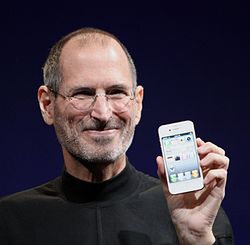When something of note happens, like an earthquake in Japan or the death of someone like Steve Jobs, I make sure my kids are aware of it. We don’t watch TV at night — I consume most of my news online — but I want them to be aware of things.
 I told them this morning that Steve Jobs had died.
I told them this morning that Steve Jobs had died.
They asked who he was. I told him he was the guy who helped invent the iPod and iPhone and iPad and my iMac.
Their first question: “Does that mean they won’t make those things anymore?”
I assured them that the world would continue to have those things, and that he had made sure that Apple would survive him. He’d been sick for a long time and knew he’d be gone pretty soon. I asked them what they knew about other famous inventors, like Thomas Edison and Henry Ford. We talked about how those guys invented things that totally changed the world, and that Steve Jobs would be remembered in the same way as them. I brought up iTunes and explained how 10 years ago, if you liked a song, you usually had to buy the whole CD. They were stunned.
Anyway, after Edison died? We still had lightbulbs.
And then as they headed to their rooms to get ready for school, I kept thinking about Edison. He invented the phonograph, the lightbulb, and the motion-picture camera. Each of those were game-changers. They impacted the way people lived, the way they experienced music, they way they entertained themselves, the way they told stories.
Steve Jobs is directly responsible for the Mac, which popularized home computers and led to the revolution in desktop publishing. He changed the way we experience music (iTunes and the iPod). He changed the way we entertained ourselves (iPad), the way we communicated with each other (iPhone), the way we told stories (from Pixar to iMovie to tweets/photos/everything on the iPhone).
I was at the gym when I saw the news of his death on a huge TV screen near the cardio equipment. I’d been listening to a podcast on my iPhone. I was timing my workout on my iPhone. I opened Safari to read about it, then I checked what people were tweeting about it. Five years ago, none of those things were possible. Today it’s my life.
I learned desktop publishing on a Mac Performa back in 1994. I started writing, in earnest, in a college newsroom populated by Mac Classics in 1994. I wrote my first full book, an unpublished novel, on a Powerbook 1400 laptop in 1997. I got my first iMac for Christmas in 1999.
Steve Jobs changed the way we lived. He changed the way I lived.
From Steve Levy’s tribute at Wired:
His accomplishments were unmatched. People who can claim credit for game-changing products — iconic inventions that become embedded in the culture and answers to Jeopardy questions decades later — are few and far between. But Jobs has had not one, not two, but six of these breakthroughs, any one of which would have made for a magnificent career. In order: the Apple II, the Macintosh, the movie studio Pixar, the iPod, the iPhone and the iPad. (This doesn’t even include the consistent, brilliant improvements to the Macintosh operating system, or the Apple retail store juggernaut.) Had he lived a natural lifespan, there would have almost certainly been more.
From Andrew Leonard’s tribute at Salon:
I will also never forget the sounds of delight my 12-year-old daughter’s friends made when she unwrapped the (just released) lime-green Nano I bought her for her birthday. That might have been the moment when I grasped the true breadth of Jobs’ genius. Pleasing Apple fanboys is easy: they’re hardcoded to worship Jobs. Pleasing market analysts is also a snap — just make those sales numbers. But 12-year-old girls? When you win their attention, you’ve won the world.
In losing Steve Jobs, we lost the 21st-century Thomas Edison. I wanted to make sure my kids knew whom we’d lost. Make sure yours do, too — their world of music and games and computers is due in very large part to Steve Jobs’ profound vision.

